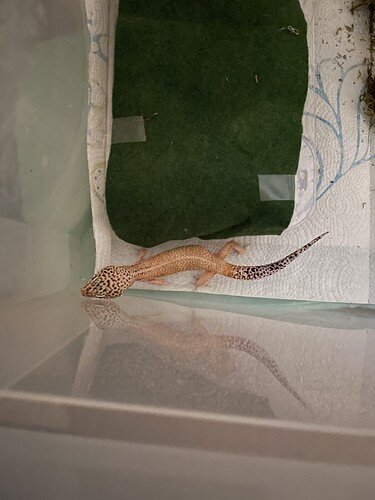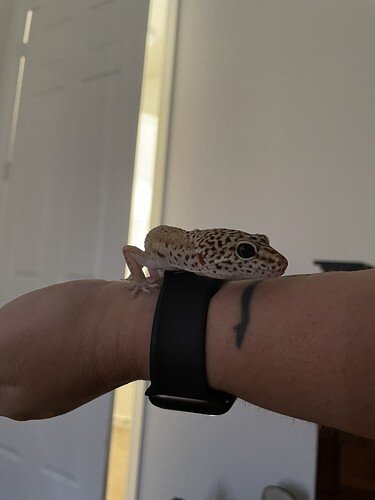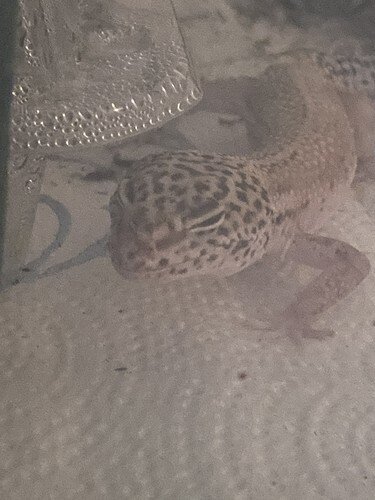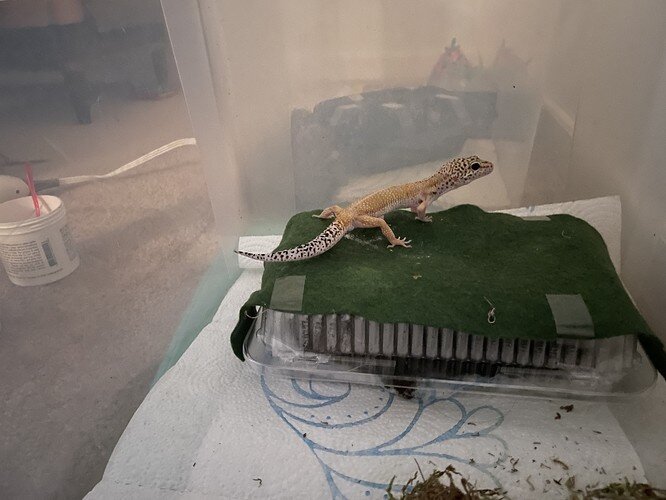My family and I just rescued a leopard gecko from a mill in Florida he’s skinny. He ate once then threw up. He is no longer interested in food. We are very worried about him does anyone have any ideas on what could be the problem?
I’d black out three sides of the tank and if you can put things like fake plants in there so he feels more secure. How long ago did you get him? I wouldn’t handle him until he’s consistently eating. What are you trying to feed him? Depending what you’re feeding him depends on what you can do next, if you’re feeding dubia roaches, bsfl or mealworms then put them in an escape proof dish if you have one, otherwise put them in a deep dish or watch them to make sure they don’t escape. Try to minimize walking by the enclosure or making eye contact with the leopard gecko. He’s been starved by the mill and by the looks of it was already dying. How are you heating the enclosure? Also if he survives you should get him checked for parasites and get fecal samples done, if you have any other reptiles keep him away from them and don’t share supplies between them and always wash your hands before touching your other reptiles.
We got him two days ago. We have offered dusted mealworms and crickets. We had some mealworms in a small bowl overnight and he took none of them. We have an under the tank heater but this is a temporary tank as we were not prepared for him when we received him. We are currently working on setting up a bigger more home like viv but I am worried about stressing him out by moving him into a new environment.
He is also doing this strange thing where he walks and rubs his head along the ground. He doesn’t seem to have stuck shed but he does it a lot.
I wouldn’t move him into a bigger enclosure until he’s consistently eating, if you can just put a ton of things, they don’t even need to represent anything natural into the tank so if he wanted to he could go from one side to the other side unseen. If you try this make sure nothing would be able to fall over on him and everything’s secure. He seems stressed out, so no handling, black out 3 sides of the enclosure, reduce noise and traffic around the tank, and try not to check on him too often, don’t handle him or lift his hides to check on him. If you need to you could move the tank to a different location. I’m going to tag @mblaney and @westridge to see if they have any input as they are both experienced with leopard geckos.
Okay thank you very much!
I just woke up, and I’ll respond thoroughly to the posts as soon as I can, but I wanted to share that the gecko looks like it needs to be seen by a herp vet, and you can find one HERE
What are the temperatures in the enclosure? Not having enough heat could easily be the cause of regurgitation, though so could a number of other things.
The cold side is 80 and the warm side is 93
I would recommend a vet visit to check for parasites. If it came from a mill they may not have kept clean enclosures. I didn’t see that @mblaney had already suggested the vet visit.
Right away, looking at the little guy, he does not look well at all. He is skinny, but he also looks like he might possibly have something else going on, which is concerning. (Not sure how to describe how I get that impression, I think it’s just from having seen a zillion leopard geckos.) The head rubbing is extremely abnormal and that enough is a reason for a vet visit. He may have a dental problem, like a tooth abscess or a throat problem that’s reducing his ability/desire to eat. His elbows suggest that he might have a history of an improper Ca:P balance as well, and likely other nutrients too. As mentioned, definitely keep him in strict quarantine until he has recovered to good health & at very least 30 days have passed. Crypto is a concern with him, and it’s a big deal, so care for him last of all your animals in a day/don’t share equipment, etc. Make sure he stays on paper towel as a substrate until he has fully recovered & finished his quarantine.
I definitely applaud you for doing your best to do right by him! It’s great that you have a humid hide & that you blocked light out from the top of it, just make sure you check inside regularly to check that it’s not soiled.
You said you rescued him from a mill- can you give more details? I’m not asking you to call anyone out, I just mean to ask if you know anything about how he was kept/age/his history/etc. Can you also give more details about how he’s being kept now? Especially temps, as mentioned. 
The regurgitation is something that should be taken seriously from a gecko in his situation. As mentioned, it could just be the result of being too cold. Generally speaking, the coldest a leo should ever really get is ~72/73•F, on the cold end & ambient room temp. Generally, I’d say the warm end of the enclosure should be around ~87/88•F (surface temp) and if the enclosure is large, you could go up to 90•F. Cooler end should be around 79•F. The heating pad should generally cover about a third of one end of the bottom (not side) of his enclosure, and there need to be places for him to hide and sleep directly over the warm end. If geckos are kept too cold, but they still eat, then they will not digest the food & it will start to rot inside them if they can’t regurgitate it.
My main piece of advice is to take him to a herp vet, not a cat/dog vet. If you can, bring a fresh fecal sample and a photo of his current setup, and have details like temps & diet ready to discuss. A fecal sample can be ‘kept fresh’ in the refrigerator for ~1.5 days if needed (don’t freeze it). A herp vet can examine him, run lab work, give specific husbandry recommendations based on exam, and all kinds of stuff you can’t get from a forum, and he looks ill enough that the expense is warranted.
I definitely also agree with what others have said- blacking out the sides of his enclosure (you can just tape paper to the sides, just keep it clear from any heating elements), holding off on handling him- and when you do, wash your hands very well before and after, add places to create additional cover for him, lower traffic around his enclosure, temps are key, etc. Make sure his enclosure is out of direct sunlight. If you need cheap hides, you can temporarily use cut toilet paper rolls.
I would refrain from offering him crickets right now, as they are the most notorious for injuring geckos if any crickets are left in the tank after the gecko is done eating. The escape-proof dish was an excellent suggestion. Make sure any prey you offer is appropriately gutloaded &dusted for the species. In his case, I’d recommend getting some of Repashy’s Calcium Plus (the one with the leopard gecko on the side of the container) and dusting with it daily for 2-3 weeks. For roaches/mealworms/superworms, you can gutload with Repashy’s Superload. For silkworms/hornworms, make sure they are grown & fed on chow, not leaves, and are small enough for him to easily eat. BSFL are awesome & don’t need to be gutloaded, but not all geckos will eat them. Don’t offer him any more food until you are 100% certain he has suitable temps. Don’t offer him waxworms.
I hope my rambling helps.  I’ve been working on a leopard gecko care sheet, and I’ll do my best to get it out as soon as I can.
I’ve been working on a leopard gecko care sheet, and I’ll do my best to get it out as soon as I can.
He was kept in an about 2 gallon tall viv rather than a long viv he also had no hides and no light source above or below the tank. He seemed very lethargic. There was no thermometer in the tank so I’m not sure of the temperature. I’m not sure if he was fed dusted food but there was no calcium dish in the tank. We were not told how old he is but if I had to guess I would say 1-2 years old because I doubt they would be keeping and older Leo. I was told to look at the babies they had which were all missing tails and had absolutely no water as well as being on sand. The place was unbearably dirty and smelled to high heavens. His tank looked as tho it had not been cleaned in a very long time
If this is a store I would consider reporting them to law enforcement. If no one stops them, they will just continue profiting from abuse. In the future, keep in mind that buying animals from those types of establishments is just financially supporting their business practices. You will also get animals that urgently need veterinary attention and a major investment in rescue care, such as your wee man.
Right now don’t bother him with a light source (though don’t keep him in pitch black), it will be a major source of stress if he’s not used to it. Leopard geckos are nocturnal- in captivity they get their vitamin D (so that they can absorb calcium) by ingesting supplements on their prey. I think it’s safe to assume he’s suffering from nutritional secondary parahypothyroidism (hobbyists call this MBD).
Luckily, it’s a weekday. Hopefully you’ll be able to get a vet appointment in the next 2-3 days, preferably tomorrow. Don’t forget about bringing a fresh fecal sample. Good luck!
I second @mblaney on reporting the establishment that you got this gecko from. I know it seems like the right thing to “rescue” them but these places only see that someone purchased the animal. Unfortunately here in Florida we have some places that turn a blind eye to that sort of thing. I remember going to flea markets when I was younger and seeing sick reptiles for sale and people holding them and then grabbing the next one sharing whatever they had with each other.
UPDATE: We are waiting for a spot to open in the vets office but we have figured out that he is a picky eater and refuses all other food other than crickets. That is the only food we found that he started to track down and eat. I’ve never had a Leo do this is that normal? My two others just see anything that moves and pounce on it. Given one is half blind and the other I took from a family friend who knew nothing about them and was starving her.
Has he even showed interest in any other food types or have you tried moving other food around with the tongs to activate prey drive? It seems like it could just be that those are the only ones that move enough for the prey drive to occur.
I moved the mealworms around and he seemed interested then smelled them and left
It may be that he needs help transitioning to a different food source, but right after acquisition, when he is obviously ill, isn’t the time to do that. It’s just that crickets are going to be tough to work with safely for a weakened gecko.
Get some crickets:
- Gutload them with Repashy’s superload or Mazuri’s hi-calcium gutload. If I recall correctly, crickets should be gutloaded for ~12 hours, no more than 24 hours.
- Dust them with a powder that has calcium, vitamin D, & other vitamins (like Repashy’s Calcium Plus)
- Hobble them (pop their back legs off with tweezers- don’t pull, squeeze)
- Put them in a dish they cannot climb out of. Without back legs they cannot jump.
Whatever you do, do not leave uneaten crickets in his enclosure, hobbled, in a dish, or otherwise. I have seen crickets eat a hole through the body wall of a weakened rescue gecko (not under my care). Also do not follow that gutloading/supplementation protocol with a healthy gecko- that would be oversupplementing.
The best thing and most important thing you can do is take him to a herp vet, along with a fresh fecal sample. All the rest of this stuff we’re suggesting is ancillary.
From what you’ve shared it sounds like you need a professional to help guide your care- your little man is in poor health and needs medical intervention. A forum can’t give you the hands-on help that he needs. To pick a random example- what if his problem is that he has a bladderstone (uncommon but I’ve seen it)? It’s possible, as he likely has a history of dehydration. The only way to know if there’s a stone is an exam & palpation by a professional, unless you are an expert. He needs an exam in his condition, especially given that he came from an abusive environment of neglect.
Sorry I am late but my female only ate crickets and it took me a little to move her to mealworms. Just keep on offering mealworms dusted with the same stuff you dust the crickets with. Some geckos are incredibly picky 
UPDATE: he is doing fantastically now and much brighter in color! His personality is really starting to pop.



